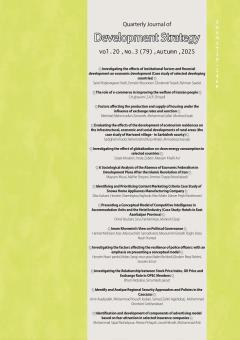Identify and Analyze Regional Security Approaches and Policies in the Caucasus
Subject Areas :
Amir Asadzadeh
1
,
Mohammad Yousefi Joybari
2
,
صمد ظهیری آغجه دیزج
3
,
Mohammad Ghorbani Gholshanabad
4
![]()
1 -
2 - Associate Professor, Department of Political Science and International Relations, Islamic Azad University, Tabriz Branch, Tabriz, Iran
3 -
4 - Assistant Professor, Faculty of Education, Tehran Kharazmi University, Tehran-Iran
Keywords: Keywords: Security, crisis, security policy, Caucasus, conflict.,
Abstract :
Amir Asadzadeh Mohammad Yousefi Joybari Samad Zahiri Agjehdizaj Mohammad Ghorbani Golshanabad Abstract Security policy in critical areas is one of the main concerns of research institutions and study centers. Security in areas such as the Caucasus is important in that the historical roots of the conflict can be traced to the politics of countries. Whenever there are manifestations of authoritarianism, countries are in a state of cooperative action. The Caucasus is a place of violent confrontation between groups with different cultural, identity and historical forms. The Caucasus region is located on the border between two Islamic and Christian civilizations and three Russian, Turkish and Iranian cultures. With an area of about a quarter of the area of Iran, this region is home to more than 50 ethnic and linguistic groups and followers of the three religions of Judaism, Islam and Christianity. Historical features and processes have an impact on regional security dynamics in Central Eurasia. For this reason, approaches are of particular importance in explaining the security policy-making processes in the Caucasus regions. This article seeks to answer the question, using a descriptive-analytical method, of what regional security approaches and policies can be identified and analyzed in the Caucasus? The findings of this research show that the Caucasus region, due to the legacy of the Soviet era and the conditions created after independence, is defined as a region where the concept of security interdependence between its units applies. Therefore, the security policies of this region can be identified and analyzed from three perspectives: realism, institutionalism, and neoliberalism.
